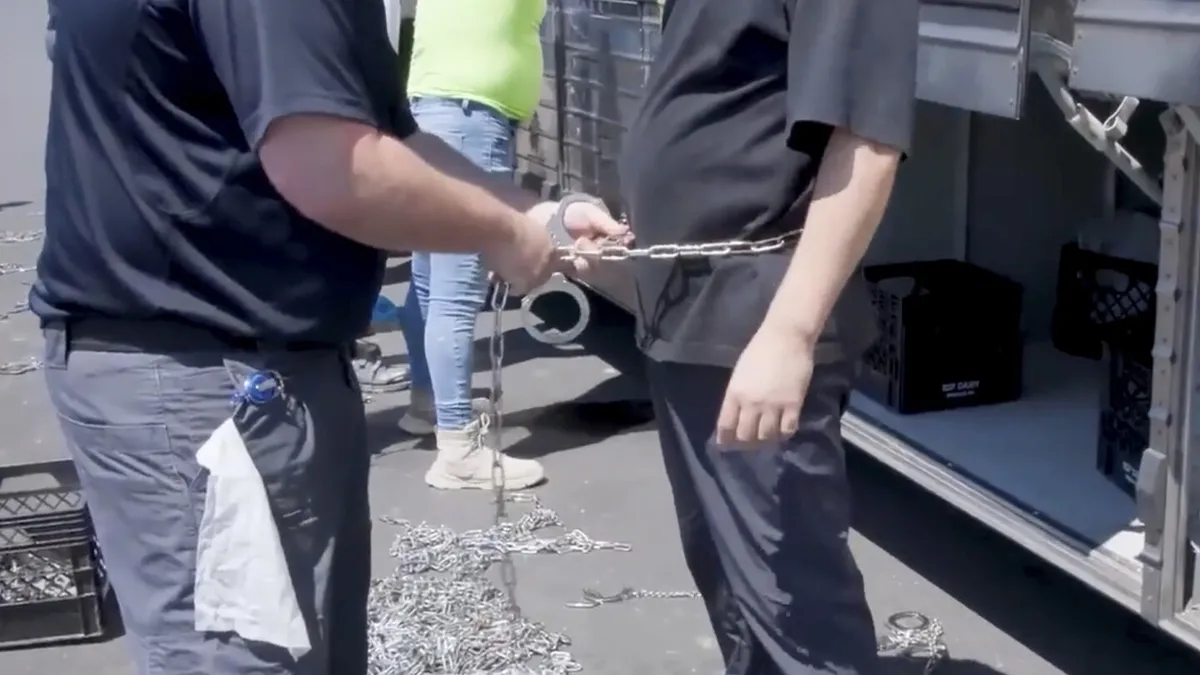
On Monday, South Korea’s foreign minister departed for the United States to finalize plans for the return of several hundred South Korean workers who were detained during a significant immigration raid in Georgia. This incident has caused widespread confusion, shock, and a sense of betrayal among the South Korean populace, especially considering the close alliance between the two nations.
The raid, which occurred on September 4, targeted a battery factory under construction at a large Hyundai auto plant in Georgia. This operation led to the detainment of 475 workers, over 300 of whom were South Korean nationals. Disturbing footage released by U.S. Immigration and Customs Enforcement showed some of these workers being shackled around their hands, ankles, and waists, intensifying the backlash from the South Korean government and citizens alike.
In a statement made on Sunday, South Korea announced that the United States had agreed to release the detained workers, indicating that a charter plane would be dispatched to bring them back home once all necessary administrative steps were completed. U.S. President Donald Trump, who initially supported the raid, mentioned that an arrangement could be made for South Korean workers to train U.S. citizens in fields like battery and computer manufacturing.
In light of the raid, the South Korean political community has been significantly shaken. During a legislative hearing prior to his departure, Foreign Minister Cho Hyun characterized the raid as “a very serious matter” that he did not foresee. Many lawmakers expressed their discontent, with Cho Jeongsik from the liberal governing Democratic Party questioning how South Korean companies could invest effectively in the U.S. following such aggressive actions by U.S. authorities.
Lawmakers from both sides of the political spectrum, including Kim Gi-hyeon from the conservative opposition People Power Party, condemned the raid as “unacceptable,” asserting that it dealt a “severe blow that will be difficult to heal.” Calls for potential retaliation, such as investigating Americans working illegally in South Korea, have also emerged, although experts believe that significant countermeasures are unlikely due to South Korea's reliance on U.S. security against North Korean threats.
The Georgia operation marks the largest single-site enforcement action by Homeland Security Investigations as part of a broader mass deportation agenda. Observers note that Georgia represents a critical area of economic cooperation between South Korea and the U.S., given the presence of numerous South Korean businesses and their planned investments.
Many South Koreans are still in disbelief following the raid, especially considering that it came shortly after South Korea pledged to invest hundreds of billions of dollars in the U.S. as part of a tariff deal. President Trump and South Korean President Lee Jae Myung had also recently held their first summit in Washington on August 25. Former head of the Korea Institute for National Unification, Kim Taewoo, criticized Trump's approach, stating that such pressure on the Korean government could have long-lasting negative implications for U.S. national interests.
The raid has also raised significant questions regarding the U.S. visa system. Steven Schrank, the lead agent with Homeland Security Investigations in Georgia, disclosed that some of the detained workers had illegally crossed the U.S. border, while others had overstayed their visas or entered on waivers prohibiting work. South Korean officials have expressed frustration with the U.S. immigration system, particularly its limitations on H-1B and H-2B visas for high-skilled foreign workers, which they view as detrimental to their companies.
As a result, many South Korean firms have been forced to rely on short-term visitor visas or the Electronic System for Travel Authorization to bring workers to the U.S. for essential manufacturing tasks. Analysts predict that this incident will exacerbate labor shortages for skilled workers with legal authorization, potentially leading to increased labor costs and disruptions in major business projects across the U.S.
During the legislative hearing, Foreign Minister Cho emphasized that the U.S. has “not responded adequately” to South Korea's requests for visa expansion and that the government plans to use the Georgia raid as leverage in future negotiations. Cho noted that some of those detained may need to return to the factory to complete essential work, and South Korean officials are in discussions with their U.S. counterparts to ensure that these workers can reenter the country.
Cho concluded by highlighting that any delays in the factory’s completion could have significant repercussions for the United States as well, underscoring the interconnectedness of the two nations' economies. As South Korea navigates this diplomatic challenge, the long-term implications for U.S.-South Korea relations remain to be seen.